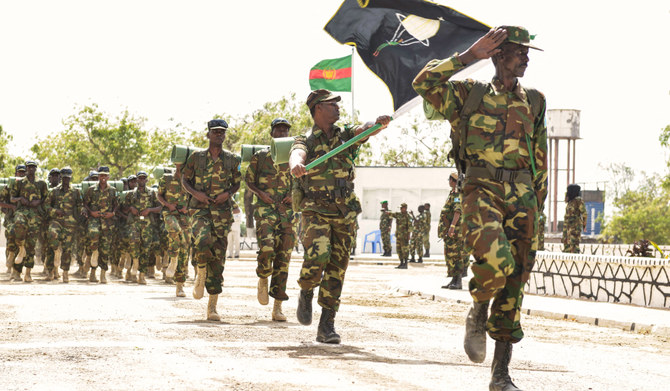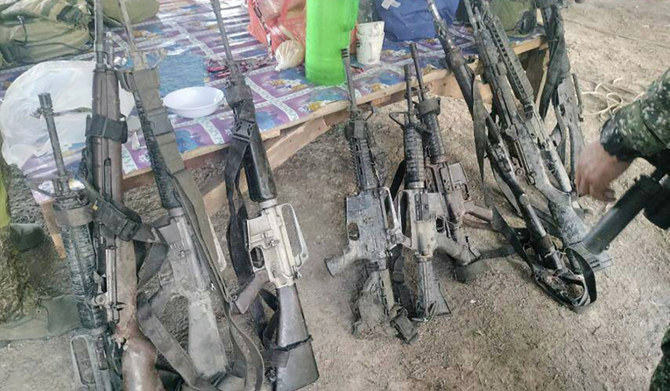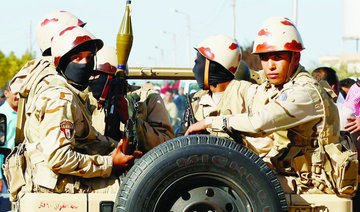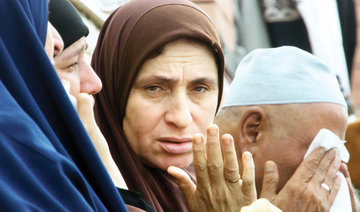A former sheriff’s deputy and purported ringleader in the bombing of a Minnesota mosque emerges in court documents as a sometimes-threatening figure with anti-government views who also wrote books and attracted others into his shadowy group.
Michael Hari, 47, allegedly intended for the attack to scare Muslims into leaving the US He and two associates were charged Tuesday with traveling from rural Clarence, Illinois, about 120 miles south of Chicago, to carry out the Aug. 5 pipe-bomb assault on the Dar Al-Farooq Islamic Center in Bloomington, Minnesota.
The explosion caused a damaging fire just as morning prayers were about to begin, but no one was hurt.
Even before his arrest, the self-described entrepreneur and watermelon farmer had a background that included working in law enforcement, floating ideas for a border wall with Mexico, fleeing with his daughters to Central America during a custody dispute and suing the federal government for allegedly cutting in on his food-safety business.
Court papers say Hari promised his accomplices $18,000 for their participation in the mosque attack. But the complaints in the case do not portray him as well off, citing an informant who said Hari frequently stayed at his parents’ home because he had no running water or electricity.
Hari describes some of his political views in a federal lawsuit he filed last month against the Department of Agriculture in which he complains it was cutting in on his food-safety certification business, Equicert.
“The People of the United States have rejected the Marxist doctrine that the government shall own the means of production,” he wrote.
Under the screen name “Illinois Patriot,” Hari posted 19 videos to YouTube in the past two months, most of them anti-government monologues delivered in a smooth, matter-of-fact voice. He wears a balaclava that obscures all but his eyes.
In a March 11 video titled “A Cry for Liberty,” Hari criticizes the Justice Department as “a political animal,” and calls the government “completely illegitimate.”
He spoke to the Chicago Tribune last year for a story on Illinois residents seeking contracts to help build the border wall with Mexico championed by President Donald Trump. Hari said he had drafted a $10 billion construction plan.
In addition to Hari, authorities charged Joe Morris, 22, and Michael McWhorter, 29. All three men live in Clarence, a community with a population of just a few dozen people encircled by farm fields. During a reporter’s visit on Wednesday, at least four homes displayed Confederate flags — one flying high atop a flagpole in a front yard.
It isn’t clear why the men targeted a mosque in Minnesota, though Al-Farooq had been in the headlines in recent years.
A group of young Minnesota men who were convicted of conspiring to travel to Syria to join the Islamic State Group had frequented the mosque. A young woman and at least one of the men who successfully got to Syria also worshipped there. Mosque leaders were never accused of any wrongdoing.
Hari fled the US in the early 2000s to live in Mexico and then the small South American nation of Belize, taking his two teenage daughters with him for fear his ex-wife would gain custody, according to media reports of legal proceedings against him after he returned to the US in 2006. He was convicted of child abduction and given probation.
The case put Hari on television.
Dr. Phil McGraw of the “Dr. Phil” talk show used an investigator to help track down Hari in Belize, shortly before Hari came back to face charges of abducting his kids.
He wrote a handful of self-published books, including essays on religion. One was titled “Resurgence: More than Conquerors.” Another was “Beowulf: A Novel of the Norsemen,” which was listed as the first in a series.
Hari belonged to the Old German Baptist Brethren, a religious sect that shares some beliefs with the Amish, although its followers do not spurn modern technology, according to 2006 coverage of his trial published in the News-Gazette in Champaign, about 30 miles south of Clarence.
Some of Hari’s neighbors told Champaign television station WCIA that Hari frightened them. One neighbor said Hari gave her “the heebie-jeebies.”
His criminal record includes a charge of assaulting a neighbor who entered his property in July, when he allegedly held the man down and pointed a pellet gun at his head. Then in February, the Bureau of Alcohol, Tobacco, Firearms and Explosives received an anonymous tip about explosives on that neighbor’s property.
Authorities found explosives, including a pipe bomb, which McWhorter said he, Hari and Morris planted to discredit the neighbor who reported the assault, according to court documents. Hari allegedly called in the phony tip.
In a March 10 video, just days before his arrest, Hari went to YouTube again and posted as “Illinois Patriot,” saying FBI and local law enforcement investigators had “run wild” and were terrorizing Clarence.
He asked “freedom-loving people everywhere to come and help us.”
Hari was raised near Champaign and went to graduate school in criminal justice at the University of Central Texas, now known as Texas A&M University-Central Texas, where he took courses in security-related construction, the Tribune reported.
The three men are also suspected in the attempted bombing of an abortion clinic on Nov. 7 in Champaign, according to the US attorney’s office in Springfield. In that attack, a pipe bomb was thrown inside but failed to go off.
A tip in December led authorities to investigate the three men, after a person sent the local sheriff photos of guns and bomb-making material inside Hari’s parents’ home. In January, a second informant told authorities that the men had carried out the mosque bombing and the failed clinic attack, according to the complaints.
Alleged leader of Minnesota mosque bombing intended to scare Muslims into leaving US
Alleged leader of Minnesota mosque bombing intended to scare Muslims into leaving US

Somalia detains US-trained commandos over theft of rations

- The US agreed in 2017 to help train and equip the 3,000-strong Danab to act as a quick-reaction strike force against Al-Shabab
MOGADISHU: Somalia’s government said it had suspended and detained several members of an elite, US-trained commando unit for stealing rations donated by the US, adding that it was taking over responsibility for provisioning the force.
The Danab unit has been a key pillar of US-backed efforts to combat the Al-Qaeda-linked militant group Al-Shabab. The US agreed in February to spend more than $100 million to build up to five military bases for Danab.
Somalia’s Defense Ministry said in a statement that it had notified international partners of the theft and would share the outcome of its investigation.
A US official said in a statement to Reuters that Washington takes all corruption accusations seriously.
“We look forward to engaging with the Danab on creating the necessary safeguards and accountability measures to prevent future incidents that could affect future assistance,” the official said, without directly addressing whether any US support had already been suspended.
The US agreed in 2017 to help train and equip the 3,000-strong Danab to act as a quick-reaction strike force against Al-Shabab.
The group has been waging an insurgency against the central government since 2006.
Danab has been heavily involved in a military offensive by the Somali military and allied clan militias since 2022 that initially succeeded in wresting swaths of territory from Al-Shabab in central Somalia.
However, the campaign has lost momentum, with the government-allied forces struggling to hold rural areas and Al-Shabab continuing to stage large-scale attacks, including in the capital Mogadishu.
Washington suspended some defense assistance to Somalia in 2017 after the military could not account for food and fuel.
The US also conducts frequent drone strikes targeting Al-Shabab militants.
Kenya flood death toll since March climbs to 70

- Tanzania Prime Minister Kassim Majaliwa said on Thursday that more than 200,000 people had been affected by the disaster, with 155 fatalities and 236 people injured
NAIROBI: The number of people killed in floods in Kenya due to heavier than usual rainfall since the start of the monsoon in March has risen to 70, a government spokesperson said on Friday.
In recent weeks, Kenya and other countries in East Africa — a region highly vulnerable to climate change — have been pounded by heavier-than-usual rainfall compounded by the El Nino weather pattern.
El Nino is a naturally occurring climate pattern typically associated with increased heat worldwide, leading to drought in some parts of the world and heavy rains elsewhere.
BACKGROUND
Kenyans have been warned to stay on alert, with the forecast for more heavy rains across the country in the coming days as the monsoon batters East Africa.
“The official tally of fellow Kenyans who regrettably have lost their lives due to the flooding situation now stands at 70 lives,” government spokesperson Isaac Mwaura said on X after torrential rains killed more than a dozen people in the capital, Nairobi, this week.
Mwaura said the government would issue a “comprehensive brief” following a meeting with the national emergency response committee after the extreme weather caused chaos across Nairobi this week, blocking roads and engulfing homes in slum districts. Kenyans have been warned to stay on alert, with the forecast for more heavy rains across the country in the coming days as the monsoon batters East Africa.
At least 155 people have died in neighboring Tanzania due to flooding and landslides.
Tanzania Prime Minister Kassim Majaliwa said on Thursday that more than 200,000 people had been affected by the disaster, with 155 fatalities and 236 people injured.
He said homes, property, crops, and infrastructure such as roads, bridges, railways, and schools had been damaged or destroyed.
In Burundi, one of the poorest countries on the planet, around 96,000 people have been displaced by months of relentless rains, the United Nations and the government said this month.
Meanwhile, the UN humanitarian response agency, OCHA, said in an update this week that in Somalia, the seasonal Gu rains from April to June are intensifying, with flash floods reported since April 19.
It said four people had been reportedly killed and more than 800 people affected or displaced nationwide.
Uganda has also suffered heavy storms that have caused riverbanks to burst, with two fatalities confirmed and several hundred villagers displaced.
Late last year, more than 300 people died in torrential rains and floods in Kenya, Somalia, and Ethiopia, just as the region was trying to recover from its worst drought in four decades that left millions of people hungry.
From October 1997 to January 1998, massive flooding caused more than 6,000 deaths in five countries in the region.
Jewish campaign group led by Gideon Falter cancels London march over safety concerns

- The Campaign Against Antisemitism says safety concerns forced it to call off its “Walk Together” march after receiving threats from ‘hostile actors’
- Last weekend, a video appeared to show police prevent ‘openly Jewish’ Falter from walking near a pro-Palestine protest but a longer version of the footage painted a different picture
LONDON: The organizers of a march in protest against antisemitism, planned for Saturday in London, “reluctantly” announced on Friday that they were canceling the demonstration.
The Campaign Against Antisemitism said it was forced by safety concerns to call off its “Walk Together” march, which was scheduled to coincide with the latest in a series of pro-Palestine marches in the British capital. The organization said it had expected thousands of people to take part but threats from “hostile actors” posed a safety risk.
“We have received numerous threats and our monitoring has identified hostile actors who seem to have intended to come to any meeting locations that we announced,” the CAA said.
“The risk to the safety of those who wished to walk openly as Jews in London tomorrow as part of this initiative has therefore become too great.
“We are no less angry about these marches than our Jewish community and its allies. We want to walk.”
The group added that it wants the Metropolitan Police not only to “manage marches” but “police” them.
Last weekend, a video that circulated on social media sparked controversy as it showed a confrontation between the CAA’s chief executive, Gideon Falter, and a Metropolitan Police officer who appeared to be preventing him from crossing the road in the vicinity of a pro-Palestine march in London because he was “openly Jewish” and his presence was “antagonizing.”
Falter, who was threatened with arrest if he did not leave the area, criticized the police for their actions during the incident and claimed there were now “no-go zones for Jews” in London amid a rise in antisemitic sentiment arising from Israel’s war on Gaza following the Oct. 7 attacks by Hamas.
Police chiefs apologized twice for the officer’s choice of words. However, a former senior police officer said on Monday that the initial, short version of the video most people saw online “did not fully represent the situation.”
A longer version showed the officer expressing concern about Falter’s actions because he appeared to be deliberately attempting to provoke the pro-Palestinian demonstrators.
Berlin police clear pro-Palestinian camp from parliament lawn

- Police dismantled tents, forcibly removed protesters and blocked the surrounding area to stop others arriving
- "The idea was to draw attention to that and ... to the German complicity and active enabling of the Israeli genocide in Gaza," the camp organizer, Jara Nassar, said
BERLIN: Berlin police on Friday began clearing a pro-Palestinian camp set up in front of the German parliament by activists demanding the government stop arms exports to Israel and end what they say is the criminalization of the Palestinian solidarity movement.
Police dismantled tents, forcibly removed protesters and blocked the surrounding area to stop others arriving.
The action followed clashes between demonstrators and police on US campuses and a blockade at Paris’s Sciences Po university, part of international protests to decry Israel’s military campaign in Gaza and Western support for Israel.
The Berlin camp ‘Besetzung Gegen Besatzung’ — ‘Occupy Against Occupation’ — began on April 8, coinciding with the start of International Court of Justice hearings in Nicaragua’s case against Germany for providing military aid to Israel.
“The idea was to draw attention to that and ... to the German complicity and active enabling of the Israeli genocide in Gaza,” the camp organizer, Jara Nassar, told Reuters.
Israel strongly denies accusations that its offensive in Gaza, which aims to destroy the Palestinian militant group Hamas, constitutes a genocide.
Nassar and a dozen protesters sat on the ground, chanting pro-Palestinian slogans and songs as police with loudspeakers called on them to leave.
“We look at what is happening in the US ... with admiration. There is no reason to believe we should stop now,” said Udi Raz, a PhD student at Berlin’s Free University and a member of the Jewish Voice association.
Raz, who wore a Jewish kippah with the Palestinian flag colors and held his phone in a live social media broadcast of the clearance, said Jewish activists had joined the camp and held a candle-lit Passover dinner there this week.
Police said the prohibition order for the camp, which had been granted authorization at the start of the protest, was due to repeated violations committed by some protesters, including the use of unconstitutional symbols and forbidden slogans.
“Protection of gatherings cannot be guaranteed at this point because public safety and order are significantly at risk,” police spokesperson Anja Dierschkesaid said, adding tents had to be moved daily under local regulations to maintain the lawn.
“For the German government, grass matters more than the lives of more than 40,000 innocent people in Gaza murdered by the Israeli military,” Raz said.
Philippine police kill an Abu Sayyaf militant implicated in 15 beheadings and other atrocities

- A confidential police report said that Abdulsaid had been implicated in at least 15 beheadings in Basilan, including of 10 Philippine marines in Al-Barka town in 2007 and two of six kidnapped Vietnamese sailors near Sumisip town in 2016
MANILA: Philippine forces killed an Abu Sayyaf militant, who had been implicated in past beheadings, including of 10 Filipino marines and two kidnapped Vietnamese, in a clash in the south, police officials said Friday.
Philippine police, backed by military intelligence agents, killed Nawapi Abdulsaid in a brief gunbattle Wednesday night in the remote coastal town of Hadji Mohammad Ajul on Basilan island after weeks of surveillance, security officials said.
Abu Sayyaf is a small but violent armed Muslim group, which has been blacklisted by the US and the Philippines as a terrorist organization for ransom kidnappings, beheadings, bombings and other bloody attacks. It has been considerably weakened by battle setbacks, surrenders and infighting, but remains a security threat particularly in the southern Philippines, home to minority Muslims in the predominantly Roman Catholic nation.
Abdulsaid, who used the nom de guerre Khatan, was one of several Abu Sayyaf militants who aligned themselves with the Daesh group.
A confidential police report said that Abdulsaid had been implicated in at least 15 beheadings in Basilan, including of 10 Philippine marines in Al-Barka town in 2007 and two of six kidnapped Vietnamese sailors near Sumisip town in 2016. The Vietnamese were seized from a passing cargo ship.
He was also involved in attacks against government forces in 2022 and a bombing in November that killed two pro-government militiamen and wounded two others in Basilan, the report said.
Abdulsaid was placed under surveillance in February, but police forces couldn’t immediately move to make a arrest because of the “hostile nature” of the area where he was eventually gunned down, according to the report.
On Monday, Philippine troops killed the leader of another Muslim rebel group and 11 of his men blamed for past bombings and extortion in a separate clash in a marshy hinterland in Datu Saudi Ampatuan town in southern Maguindanao del Sur province, the military said.
Seven soldiers were wounded in the clash with the members of the Bangsamoro Islamic Freedom Fighters.
The Abu Sayyaf and the Bangsamoro Islamic Freedom Fighters are among a few small armed groups still struggling to wage a separatist uprising in the southern Philippines.
The largest armed separatist group, the Moro Islamic Liberation Front, signed a 2014 peace pact with the government that eased decades of sporadic fighting.
Moro Islamic Liberation Front rebel commanders became parliamentarians and administrators of a five-province Muslim autonomous region in a transition arrangement after signing the peace deal. They are preparing for a regular election scheduled for next year.




















